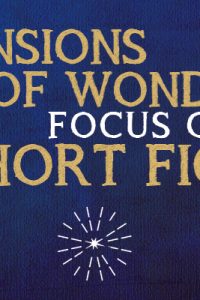Spotlight on: SF Signal
 John DeNardo is the co-founder and managing editor of SF Signal. He has been known to do things for free bagels.JP Frantz is the co-founder and sometimes blogger/editor of SF Signal. Patrick Hester is an author, blogger, and 2013 Hugo Award Winner. He produces/hosts the
John DeNardo is the co-founder and managing editor of SF Signal. He has been known to do things for free bagels.JP Frantz is the co-founder and sometimes blogger/editor of SF Signal. Patrick Hester is an author, blogger, and 2013 Hugo Award Winner. He produces/hosts the
SF Signal and Functional Nerds podcasts and produces Mur Lafferty’s I Should Be Writing Podcast. His fiction can be found via his Amazon author’s page.
JP Frantz: SF Signal started in 2003 when we noticed a criminal lack of any science fiction-oriented blogs on the Internet. Being the tech geeks we are, we decided to start our own blog as a place to share interesting links and bits of SF/F and to avoid clogging the corporate e-mail servers with our stuff. Fast forward to 2014, and SF Signal has grown to become a two-time Hugo Award-winning fanzine with quite a large readership, so clearly people like and enjoy what we blog about. Though we still clog the corporate e-mail server. Mostly with cat pictures.
SF Signal basically started as a place for us to post interesting links and discuss them. Over the years we gradually added more original content which seems to have served us well. Much like the beginning, we see SF Signal as a place for like-minded SF/F fans to meet and discuss whatever topics interest them.
How did the current editorial staff come together, and how do you divide up your responsibilities?
JP: What started with both John and me as the main contributors has grown into the multi-headed hydra you see today. Blogging takes a lot of time if you want to do it right, so it seemed to make sense to invite others to share their passion for SF/F on our site. When an area of need presents itself, we ask around to see if anyone is interested in contributing. We now have numerous individuals contributing all sorts of posts to SF Signal on multiple aspects of the genre. Without them, the site would not be where it is today.
You’ve got a huge number of contributors. What are the advantages and disadvantages of working with so many voices? How are things organized?
John DeNardo: The advantage of having multiple contributors is that you get multiple viewpoints on different aspects of speculative fiction. We all bring our own worldviews and experiences to the table. The end result, hopefully, is offering readers a variety ways of looking at different elements of speculative fiction.
From a content perspective, having multiple contributors seems like a blessing. It is, in some ways; gone are the days where one person alone feels like they must… feed… blog. That said, that content still takes time to coordinate, edit, lay out, etc. That’s not a disadvantage, per se, but it’s not ‘‘free’’ content either, time-wise. And to be clear, we are incredibly grateful to our contributors and the guests who have come on to talk about the SF/F field.
Organizationally, people pretty much work at their own pace. The main idea behind SF Signal is that it’s supposed to be fun. Why do it otherwise? There are more important things in life than blogging, and people are contributing on their own free time, so I’m not super strict with editorial deadlines. There are enough contributors that there’s always something fun to post every day.
You cover a lot literary SF/F and horror news, but also publish interviews, reviews, and commentary. Are you more interested in documenting the field, or in trying to shape it?
John: Our main motivation for doing any of this is to share our love of genre with like-minded readers through various types of posts. One of the best parts of interacting with fans – online or in-person at conventions – is talking about the books we like to read and the films and television we like to watch. Along the way, I suppose we are documenting the field, somewhat. Our daily link posts could easily stand as an archive of what people in the community were talking about at the time. I don’t think we’re actively trying to shape it. We don’t have an agenda. We’re just a bunch of folks having fun.
Tell us about your best – or most popular, or most controversial – entry on the site. What sparked the most conversation?
John: Traffic-wise, our Flowchart for Navigating NPR’s Top 100 Science Fiction and Fantasy Books (link) as well as the companion Interactive version (link) are still getting hits more than 2 years after they went up, so those are fairly popular. As far as interaction with the community, Kate Elliott’s guest post The Omniscient Breasts (link) was quite lively. Any posts we’ve done that are controversial only became that way accidentally; they were never intended to be. We’re just not into trying to incite others to draw traffic. After a while, such noisy tactics tend to drown out the otherwise good content that gets lost in the shuffle, so we just try to stay focused on sharing our genre experiences, likes, and dislikes.
You also help run the SF Signal podcast, a Hugo-nominated fancast. How did that begin, and what’s it like?
Patrick Hester: A long time ago, singer/songwriter John Anealio approached me about combining our individual podcasts into a single podcast called The Functional Nerds, a term I’ve used to describe myself for years. When we were discussing that, it came up that we would need a place to host the podcast. I suggested SF Signal, but we didn’t think John D. would go for it, given that SF Signal is so well established within the community, and we were just starting up this podcast thing, so we decided not to pitch the idea to John D. at that time, and started building The Functional Nerds.
Once we had a few (quite a few, actually) episodes and interviews under our respective belts, we decided to revisit the idea of doing a podcast for SF Signal. By then, The Functional Nerds had a following and a brand all its own, and it didn’t seem to us that it fit to take that show to SF Signal. Instead, we pitched a new show that would include a lot of the content from SF Signal. John D. liked the idea, and gave us the go-ahead.
The SF Signal Podcast has changed a lot in the years since we started. John Anealio only did the first few episodes. The single format including a panel discussion – similar to what you might find at a con – followed by an interview, also went away. I split the shows up, giving listeners a panel on Mondays, and an interview on Thursdays, and that’s worked really well for us. As of this writing, we’ve done over 230 shows. Can it be a grind doing two hours of SF Signal, another hour of Functional Nerds, and two to four hours of I Should Be Writing every week? Absolutely. But I love it. I love the interaction and getting to know all these wonderful authors, editors, and artists within speculative fiction – and exposing our listeners to someone they might not have heard of before.
Nothing is better than coming to the site after an episode goes live, and seeing a bunch of comments from people who can’t wait to buy one of the books we discussed.
Talk a bit about your recurring Mind Meld feature.
JP: The Mind Meld feature was shamelessly ‘‘leveraged’’ from a similar idea on the now defunct Meme Therapy website: ask a question to various authors/bloggers/other interested parties and see what happens. We try to ask a variety of people their opinions on whatever topic strikes our fancy and, with a stable of four Mind Meld facilitators, we have a variety of viewpoints to keep questions interesting. We’ve been publishing this feature for just over six years now and it’s always one of our more popular items. Our first Mind Meld? ‘‘How have online book reviews affected the publishing world?’’, from Dec. 2007.
Is there anything else you’d like our readers to know about you or your work?
Patrick: John DeNardo is the hardest working person in fandom, and I am really, really glad to call him my friend. If you meet him at a con, buy him a bagel. If you’re interested in my stuff, you can find me hanging out at www.atfmb.com, twitter.com/atfmb, and facebook.com/atfmb. My writing is available via Amazon; just search Patrick Hester and you should find it.







